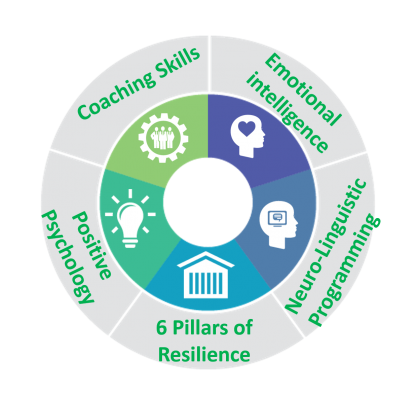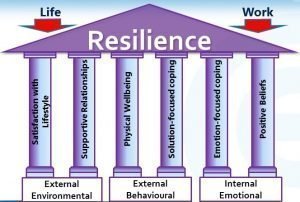Methodology
Frameworks for success
When organisations as diverse as The US Airforce, Nationwide, L’Oreal & certain country’s Intelligence Services turn to emotional intelligence skills it’s because other ways hadn’t worked.
The methods and approaches used on our programmes are rich with benefits helping people lead, engage, cope & thrive in today’s fast moving, dynamic environments. Here are some we use with, and teach to, our clients as part of our emotionally intelligent programmes.

Executive coaching
Bringing out the best in people & organisations is an art. Coaching skills are a set of powerful facilitation tools that explain and facilitate a coaching relationship. Tried & tested over the past 30 years coaching techniques focus on building empowerment rather than the old command-control paradigms & include;
- Asking open questions rather than directing
- Identifying core drives
- Understanding & building positive beliefs
- Developing empowering goals & motivation
- Building resourcefulness
The end goal of coaching is self-leadership; encouraging people to step-up, take responsibility, become emotionally mature & engage others effectively by bringing out the best in themselves & others. Learn more about our executive training courses.
Emotional intelligence
Proven to be more effective at bringing success than your IQ, degrees or technical skills combined, EQ testing, modeling & skills development focus on building performance. EQ reveals exactly what a specific role needs in terms of skills, to perform well. We use two EQ models which encompass a huge range of personal & social attributes. Read more here.
Neuro-Linguistic Programming
NLP is the science of understanding how our mind works in relation to beliefs, behaviours & the language that bring about our success. It gives us powerful insights & tools to perform better. Read more.
6 Pillars of Resilience
The 6 Pillars of Resilience

The 6 Pillars of Resilience model represents the key evidence-based qualities for creating powerful resilience. It’s a clever way to understand & breakdown resilience skills into easily learnable components & is the backbone of our world-class resilience programmes. The 6 Pillars is a pro-active model that’s simple to learn, assess yourself & inspires people to;
- Do what you love, love what you do
- Share openly & ask for help from others
- Eat well, sleep well, stay active
- Gain perspective, build strategies, plan & take action
- Nurture emotional maturity, balance & a peaceful mind
- Practice positive thoughts & deeds & manage limiting beliefs
Note: The 6 Pillars of Resilience is our proprietary model crystalised from a wide-range of research. It’s a clever way to learn & grow that we think you’ll find easy & accessible. Read more.
Positive Psychology
Positive Psychology is a relatively recent concept. It’s a wholly refreshing view of human achievement rapidly growing in support. It focuses on a positive psychology of fulfilment & wellbeing, based on what works for people as opposed to focusing on curing problems & illness, once they arise (the focus of the past 100 years of medicine & psychology).
Practical Application
The entire US Army underwent the Comprehensive Soldier Fitness (CSF) Resilience Programme. It was designed to help soldiers cope with extreme stress & reduce Post Traumatic Stress Disorders (PTSD) & suicides.
Designed in 2009 by Martin Seligman it’s based on his & Mihaly Csikszentmihaly’s Positive Psychology research. It concentrates on wellness rather than illness & mental health rather than mental illness. It provides a positive view of people & health that is in stark contrast to the general approach to health in the 19th & 20th centuries in the West.
Through the work of Seligman (an ex-president of the US Psychological society) we increasingly realise that actively promoting well-being is not only healthier but much more efficient in the long run.
The CSF’s three components;
Building mental toughness, leading with strengths & developing new social skills for leadership. Our EQ Leadership programmes have a very similar structure & focus.
Total Release Experience (TRE)
TRE is a relatively new method that is having some significant positive effects on people, including this writer.
We, our bodies that is, accumulate stressful experiences in our daily lives. The stress & trauma can stay in our bodies. This creates angst, stress & can re-create the emotional states that initiated that stress in the first place. If we feel stressed in our bodies, we then feel stressed in our minds.
TRE is the natural way of shaking out our trauma & stress during a 30-minute exercise. This exercise can be easily learnt in a day. Once learnt it’s your gift forever; No refreshers needed, no group classes. Having used this for over 2 years & seen the effects on many in stressful roles, including Fire-Fighters, I’m convinced of the power of this process.
It’s based on the principle that the mammalian body creates emotional experiences & then let’s them go. That’s the theory. However, in practice us humans are not good at letting emotions go. Because of cultural beliefs we’ve lost our understanding & ability to do this effectively & in a timely way.
We run TRE one day workshops through TREUK. This simple but fascinating practice once learned is yours for life. Contact us about TRE.
Mindfulness
What is mindfulness?
 To be ‘mindful’ means directing your attention to your mind, the thoughts, your emotions & your body – to feelings & your environment. It’s a practice of allowing thoughts & emotions to be noticed but importantly to allow yourself to let them go & not be hooked by them. This allows the mind to become clearer. You become more disciplined & natural at being centred & less distracted.
To be ‘mindful’ means directing your attention to your mind, the thoughts, your emotions & your body – to feelings & your environment. It’s a practice of allowing thoughts & emotions to be noticed but importantly to allow yourself to let them go & not be hooked by them. This allows the mind to become clearer. You become more disciplined & natural at being centred & less distracted.
Need for Mindfulness
Our lives & work are increasingly busy & complex. Technology drives speed of communication & action. We are not computers & yet we are trying to keep up. There are many distractions & can feel pressured & become more stressed. We feel the need to understand & work with these ever-increasing demands on us & this takes a certain strength of mind, discipline to centre the mind & cope.
Benefits of Mindfulness
o Develops physical, emotional & spiritual well-being
o Improves levels of calmness of mind & body
o Brings greater life enjoyment
o Helps you spot opportunities
o Encourages effective self- management & of others
o Facilitates more pro-active rather than re-active moments
o Brings feelings of control & lessens anxiety
o Lowers blood pressure & heart rate
o Improves sleep quality
o Diminishes stress-related illnesses
o Reduces chronic conditions & pain
o Benefits many other areas besides
NOTE: There is no doubting the power of mindfulness practice to enhance life in a multitude of ways.
However, please be ‘mindful’ (ha!) that the right techniques for you or your people need to be carefully selected. For instance, people with high levels of anxiety or speedy-mind may find this practice a bridge too far, initially, to start their development with. In fact, using any method when you’re not quite ready for it or without the right support, may have detrimental effects on your overall belief in the ability to improve your well-being & happiness.
Ask us about meditation courses or as part of a wider Emotional Intelligence programme.
· Meditation introduction course
· Mindfulness Meditation – 8-week course
· Transcendental Meditation course
Simple Guide to Mindfulness Practice
A simple guide to Mindfulness practice
1) Simply observe your thoughts – grow the nurturing part of your consciousness whose sole purpose is to watch and notice but do so without becoming hooked into or involved in what it notices.
2) Learn to let-go – the letting go of these thoughts and feelings and resisting becoming hooked or involved with any of them; do not judge, simply accept them and move on. So, when you build this ‘watching’ muscle so to speak you stay consciously aware of what’s happening in your mind without passing judgement about any of your experiences. This is also described as being ‘in the present moment’, or simply ‘being’, not doing.
3) Focus on the space between the thoughts and expand this space. And because your mind may be constantly creating and moving this may not be as easy as it sounds, though it becomes easier with practice as this metaphorical muscle, this practice, becomes stronger.
4) Stick with it and trust – Know there is no good or bad or perfect experience or outcome – only the practice of watching and not attaching to any thought or emotion. Whilst practicing you may drift into thought – this is fine. As soon as you notice, gently and compassionately bring yourself back to watching and the ‘space’.
In a nutshell: People sometimes think that meditation is about seeking purely spiritual answers or having the ‘perfect’ experience. It’s not.
I hear things like it’s ‘naval-gazing’ or ‘that’s not my thing’ or ‘I haven’t got the time’, or ‘It sounds boring’. The untrained mind can create lots of excuses or distractions and prefer to stay untrained, untamed. There is more power in our minds than we know – ‘being’ not ‘doing’ can unlock this power.
‘Being’ must be experienced, it cannot be thought’. A Mindfulness quote by Eckhart Tolle.
The incredible truth is we have this amazing thing called a thinking brain and yet we don’t know how to use it. We never read the instruction manual so to speak. How often do we even take a moment’s look at its working, even though doing this can bring a huge range of benefits? Being mindful is an incredible way to take ownership of our most powerful facet, our mind. This then helps us take ownership of our lives.
Ask us about our QUICK GUIDE TO RELAXATION & MINDFULNESS.
Read more in the seminal books of Professor Jon Kabat-Zinn on Mindfulness Stress Reduction and The Power of Now by Eckhart Tolle.
Like so many worthwhile things though it needs a little time and trust to try it on for size.
Culture starts with senior leaders
Moving to self-management and being proactive
Developing a staff culture strong on self-management & proactive behaviours is an intelligent long-term solution to some key organisational issues.
This type of culture requires a purposeful moving away from command-control & micro-managing towards ‘trust’ management. We help organisations progress step-by-step towards this approach, but we freely acknowledge it requires a change in thinking & trust in people, which some take to more easily than others.
Culture begins at the top with the most senior leaders. Most leaders, however, are unaware of the culture they implicitly create. We can reveal what cultures leaders create & show how to purposefully create ones that better serve. To succeed there is no substitute for starting at the top.
Make an enquiry
Tell us what you’re looking for or simply ask for more information. All communication is confidential and with no obligation
Make an enquiry
Motivational speaker
Our insightful & motivational speaker will inspire, educate & entertain your audience
Training
Develop practical business-focused skills that focus on leadership, resilience & relationships
Executive Coaching
Our unique ei approach brings new insights & resources to achieve your goals & much needed skills